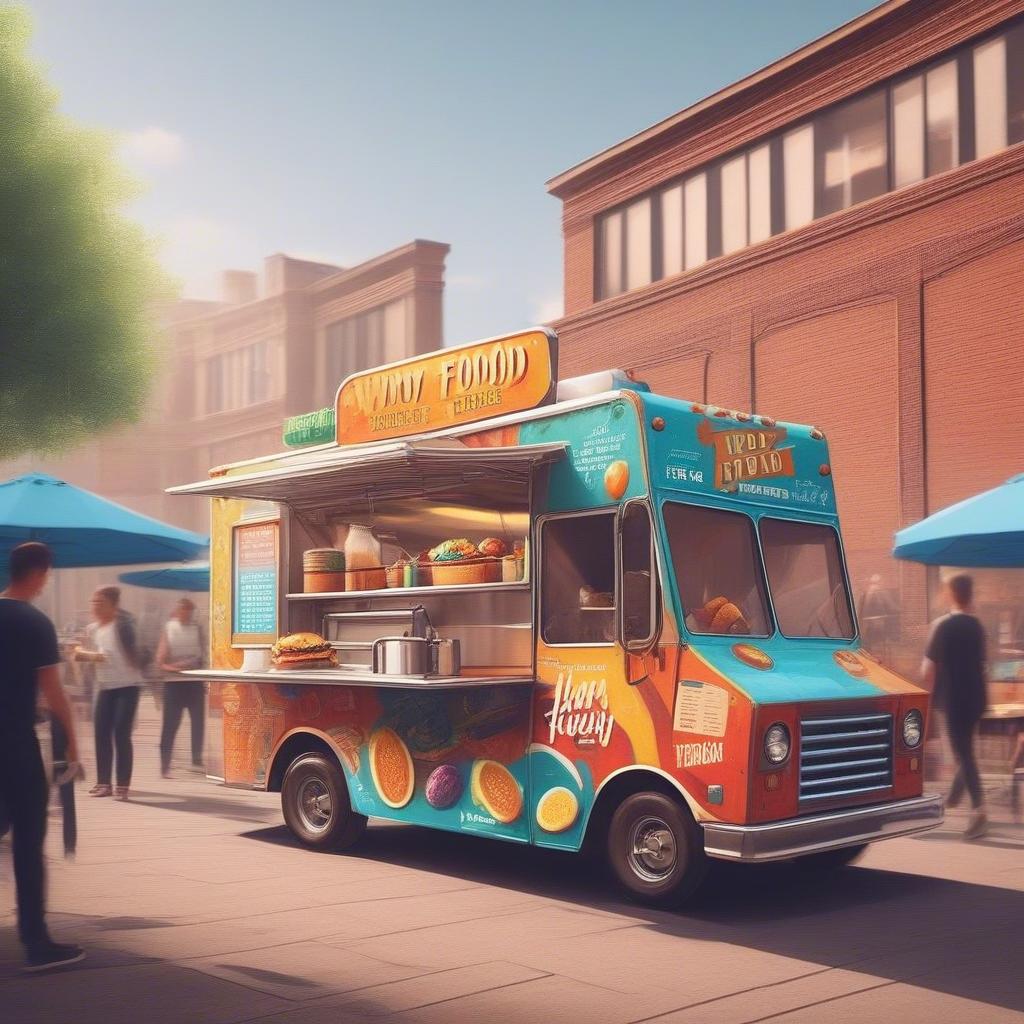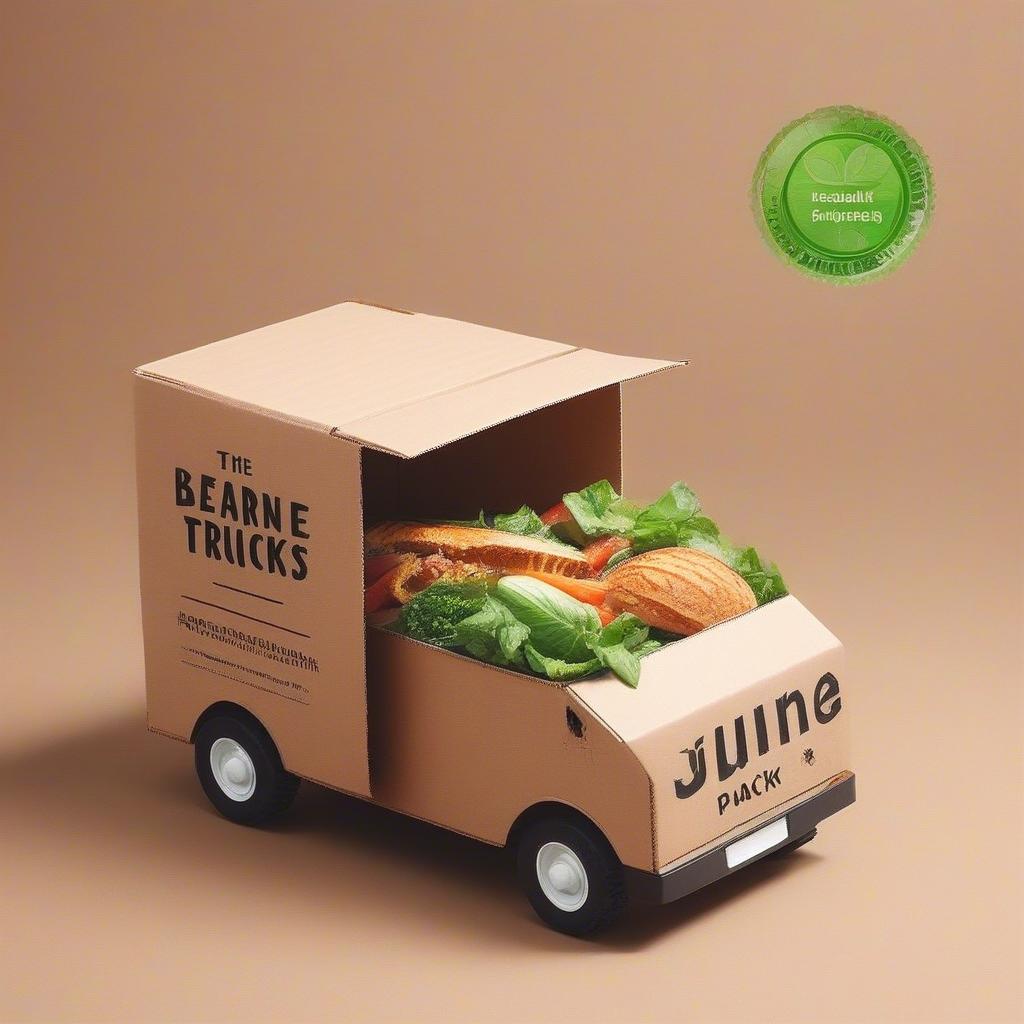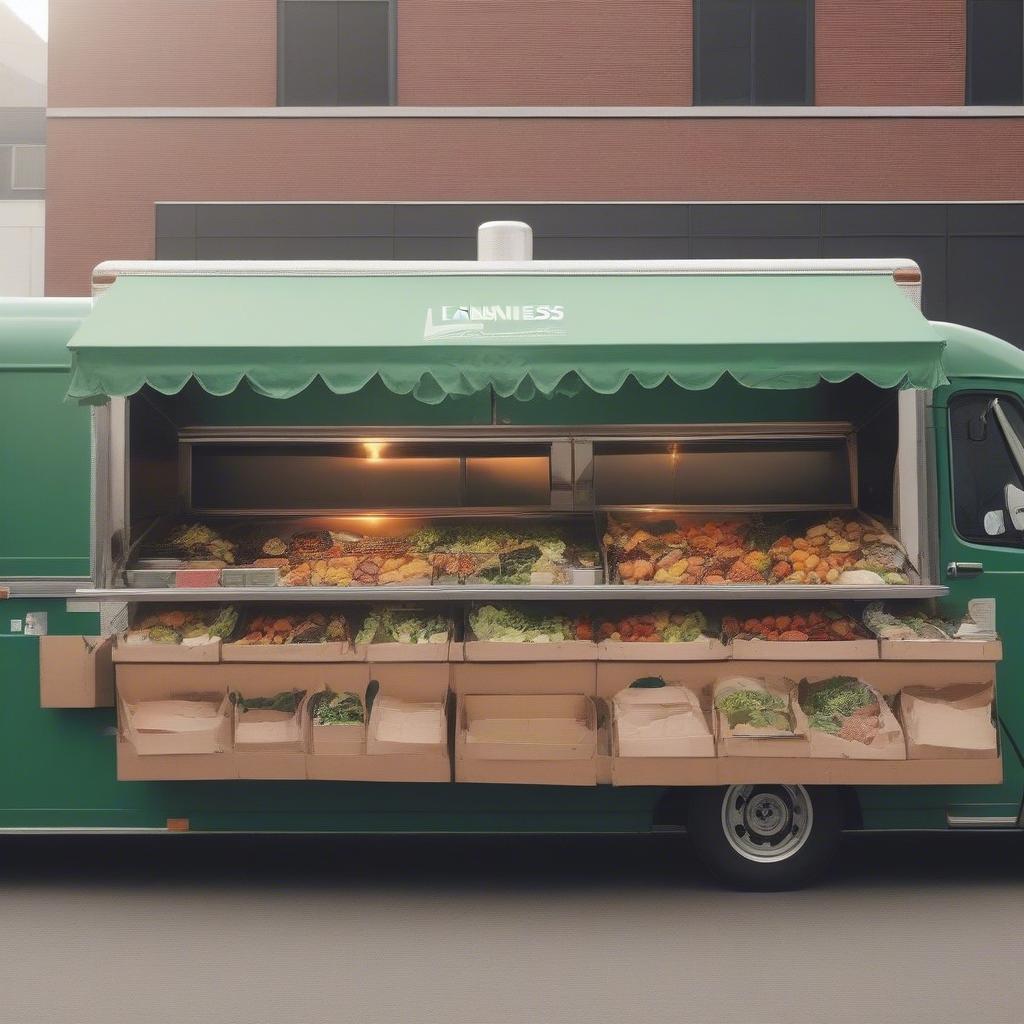
The aroma of sizzling onions, the vibrant colors of fresh produce, and the rhythmic clanging of utensils – this is the symphony of street food. But the landscape is changing. The humble cart is evolving into something more mobile, more innovative, and undeniably more powerful: the food truck. This isn’t just a passing fad; it’s a fundamental shift in how we experience and consume food on the go. Let’s explore why food trucks are not only a current trend but also the undeniable future of street food.
The Rise of the Mobile Dining Revolution
From Carts to Culinary Powerhouses
For generations, street food was synonymous with pushcarts and stalls. These were often simple operations, offering limited menus. While they hold a special place in our hearts (and stomachs), they lack the versatility and scalability of today’s food trucks. Think of it as the evolution of transportation. We started with horse-drawn carriages and moved to powerful automobiles – similarly, the food truck is the upgraded, modern version of the traditional street food vendor.
Flexibility: The Key Ingredient
The power of a food truck lies in its flexibility. It’s a restaurant on wheels, able to adapt to changing demands and locations. Got a festival next weekend? A food truck can be there. Want to target the late-night crowd? A food truck can adjust its hours. This adaptability makes it a powerful force in the culinary world, responding directly to consumer needs and desires, a core component of thriving street food trends.
Innovation: Where Culinary Creativity Thrives
Within the compact kitchen of a food truck, chefs are finding new freedom. They’re pushing boundaries, experimenting with unique flavors, and offering diverse cuisines that you wouldn’t typically find at traditional restaurants. This fosters a vibrant culinary scene, driven by passion and ingenuity, moving the whole sector towards a stronger future, proving why food trucks are the future of street food.
Why Food Trucks are Overtaking Traditional Street Food
Cost-Effectiveness: A Lower Barrier to Entry
Opening a brick-and-mortar restaurant involves substantial upfront costs – rent, renovations, and equipment purchases. Food trucks, on the other hand, present a significantly more affordable option. This lowered barrier to entry allows more aspiring chefs to realize their culinary dreams, enriching the overall street food trends landscape and expanding the variety of options available.
Startup Costs: An Eye-Opening Comparison
- Traditional Restaurant: High rent/mortgage, significant renovation costs, expensive kitchen equipment, complex permitting, full staff payroll.
- Food Truck: Lower initial investment in truck purchase or lease, less complex equipment, simpler permitting process, smaller staff.
Mobility and Accessibility: Reaching More Customers
Fixed locations limit customer reach. A food truck, however, can go wherever the customers are. It can travel to busy city centers during lunch hours, park near sporting events, and attend community festivals, maximizing exposure and sales. This strategic mobility makes food trucks more convenient and accessible, ensuring that more people can experience the delicious flavors they offer, truly defining mobile dining.
Direct Customer Interaction: Building Relationships
Food trucks foster a unique and intimate connection between chefs and customers. The proximity allows for face-to-face interactions, creating a more personalized experience. Chefs can explain their dishes, take feedback in real-time, and build a loyal following, something often lost in the more formal setting of a traditional restaurant. This customer engagement is crucial for business success, and this is why food trucks have secured their place in the future of street food.
Agility and Responsiveness: Adapting to Change
The culinary world is constantly evolving, with new trends emerging all the time. Food trucks, because of their agility, can adapt much faster to these changes than traditional restaurants. They can adjust menus, experiment with new dishes, and respond to customer feedback quickly and efficiently. This responsiveness is key to staying relevant and competitive, securing their position in the ever-changing street food trends.
The Food Truck Advantage: Benefits for Customers and Entrepreneurs
For Customers: Variety, Convenience, and Affordability
Food trucks offer a plethora of benefits to customers:
- Variety: From gourmet burgers to authentic ethnic cuisine, food trucks showcase a wide range of culinary options, catering to diverse tastes.
- Convenience: Their mobility makes them easily accessible, allowing customers to grab a quick and delicious meal on the go.
- Affordability: Often, food trucks offer high-quality food at more affordable prices compared to traditional restaurants.
- Unique Experience: The casual and engaging nature of food trucks makes dining more enjoyable and memorable.
For Entrepreneurs: A Viable Business Model
For aspiring entrepreneurs, food trucks offer a compelling business model:
- Lower Investment: Significantly reduces the initial financial burden compared to opening a traditional restaurant.
- Flexibility: Allows for creative freedom in menu development and business operations.
- Quick Setup: Can be established faster and more efficiently than a traditional restaurant.
- Higher Potential for Profit: Reduced overhead costs allow for potentially higher profit margins.
- Direct Feedback: Enables close interaction with customers, fostering loyalty and informed decision-making.
Key Strategies for Food Truck Success
Crafting a Unique Menu
The menu is the heart of your food truck. Focus on a specific cuisine or concept, and strive to offer high-quality ingredients and unique flavor profiles. Make sure to regularly evaluate the customer preferences to tweak the menu and always stay competitive in the ever-evolving street food trends.
Menu Development Tips:
- Focus on a niche: Don’t try to be everything to everyone.
- Use high-quality ingredients: The better the ingredients, the better the flavor.
- Offer signature items: Develop dishes that are unique to your food truck.
- Keep it concise: A shorter menu is easier to manage and allows you to focus on quality.
- Incorporate seasonal items: Take advantage of fresh, local produce when available.
- Consider dietary restrictions: Offer vegetarian, vegan, and gluten-free options.
Mastering the Art of Location
The success of your food truck heavily relies on your location. Research busy areas with high foot traffic, and explore opportunities at festivals, events, and markets, while keeping in mind the local regulations. Understanding the local dynamics of the areas where you operate is crucial to have a thriving business and that’s why food trucks are so dominant in the world of mobile dining.
Location Strategies:
- Research high-traffic areas: Identify busy areas during lunch and dinner hours.
- Consider proximity to office buildings: Cater to the lunchtime crowd.
- Explore community events and festivals: Maximize exposure and sales.
- Partner with local businesses: Collaborate to offer unique experiences.
- Vary your location: Don’t be afraid to move around to reach different customers.
- Always check local regulations: Obtain all necessary permits and licenses.
Effective Marketing and Branding
Building a strong brand is crucial for a food truck to stand out from the competition. Develop a memorable logo, engage with customers on social media, and consider loyalty programs. These are the basis to develop a strong brand that stands out in the modern world of street food trends.
Marketing and Branding Tips:
- Develop a strong logo and brand identity: Make your food truck visually appealing and memorable.
- Create engaging social media content: Share photos, videos, and customer testimonials.
- Run promotions and discounts: Attract new customers and encourage repeat business.
- Offer a loyalty program: Reward your loyal customers.
- Participate in local events: Increase brand visibility and community engagement.
- Encourage online reviews: Generate positive feedback and credibility.
Operations and Efficiency
Efficient operations are the key to maximizing profits. Streamline your processes, manage your inventory carefully, and invest in the right equipment. This is fundamental for success in the sector of mobile dining.
Operational Strategies:
- Streamline your workflow: Maximize efficiency in the limited space of your food truck.
- Implement an inventory management system: Reduce waste and prevent shortages.
- Invest in reliable equipment: Avoid breakdowns and delays.
- Train your staff effectively: Ensure consistent quality and service.
- Manage your finances carefully: Track your expenses and revenue.
- Prioritize cleanliness and hygiene: Maintain a safe and healthy environment.
Customer Service Excellence
Providing outstanding customer service is crucial for the long-term success of any business, especially in the competitive street food trends. Treat your customers with warmth, remember their preferences, and strive to exceed their expectations. This is the core of building a strong brand that will thrive in the future of street food.
Customer Service Tips:
- Train your staff to be friendly and helpful: Create a positive experience for your customers.
- Remember your regulars: Personalized service can significantly increase customer loyalty.
- Respond promptly to customer feedback: Show that you care about their opinions.
- Go the extra mile: Offer small gestures of kindness to make customers feel valued.
- Create a welcoming and inclusive environment: Make everyone feel comfortable and respected.
- Embrace a customer-centric mindset: Prioritize the customer experience in all aspects of your business.
Technology and the Future of Food Trucks
Technology is playing an increasingly important role in the food truck industry. From online ordering to mobile payment systems, these advancements are improving efficiency, customer experience, and overall profitability. This is the future of mobile dining, and it’s an integral part of the new landscape of street food trends.
Online Ordering and Delivery
Online ordering platforms and delivery apps are allowing food trucks to reach a wider customer base, and this is transforming the face of mobile dining. Customers can easily order their favorite dishes online and pick them up at the food truck or have them delivered, creating a seamless and convenient experience.
Mobile Payment Systems
Cashless payment methods are becoming increasingly popular, making transactions faster and easier for both the customer and the food truck operator. Embracing mobile payments is essential for any food truck operator who wants to remain competitive and attract a younger demographic.
Data Analytics
By using data analytics, food truck businesses can track sales, analyze customer preferences, and make informed decisions about menu development, location, and marketing strategies. These insights are fundamental to improving efficiency and profitability.
Social Media Marketing
Social media has become an indispensable tool for food trucks to connect with customers, promote their offerings, and build their brand. Through compelling content and targeted advertising, food trucks can attract new customers and foster a loyal following, playing a vital role in shaping street food trends.
Learn Business: Your Partner in Food Truck Success
Starting a food truck can be challenging, but with the right guidance and resources, you can increase your chances of success. This is where Learn Business comes in. We provide comprehensive support for small businesses, including food trucks, helping you navigate the complexities of launching and growing your business.
Guidance and Support
We offer expert advice and mentorship tailored to the specific needs of your food truck. Our experienced professionals can help you with everything from menu development to marketing and financial planning.
Templates and Tools
We provide a range of ready-to-use templates and tools that can save you time and effort, including business plan templates, financial projections spreadsheets, marketing plan frameworks, and inventory management tools. These are tailored to the specific needs of the food truck industry.
Examples of Templates We Offer:
- Business Plan Template: A structured guide for outlining your business goals, target audience, and strategies.
- Financial Projections Spreadsheet: An easy-to-use tool for forecasting revenue, expenses, and profitability.
- Marketing Plan Framework: A comprehensive roadmap for attracting customers and building your brand.
- Inventory Management Tool: A system for tracking stock levels and minimizing waste.
- Menu Costing Template: A tool to calculate the cost of each dish and ensure profitability.
Personalized Support
We understand that every business is unique, so we offer personalized support and guidance tailored to your specific circumstances. Our team is committed to helping you overcome challenges and achieve your goals, making us a strong partner in the future of street food.
Join our Community
When you partner with Learn Business, you become part of a supportive community of entrepreneurs. This network provides valuable resources, advice, and encouragement, enabling you to grow and flourish in the dynamic world of food trucks and mobile dining. Together, we can shape the street food trends of tomorrow.
Conclusion
The rise of the food truck is a testament to the evolving tastes of consumers and the dynamism of the culinary landscape. They are more than just a trend; they are a fundamental shift in how we experience and consume food on the go. With their flexibility, cost-effectiveness, and potential for innovation, food trucks are poised to continue their dominance in the street food trends, securing their place as the future of street food. By embracing the strategies outlined in this article, coupled with the support of Learn Business, aspiring entrepreneurs can seize the opportunities and realize their culinary dreams in this exciting and ever-evolving market of mobile dining. The future of street food is on wheels, and it’s a delicious one.



Leave a Reply